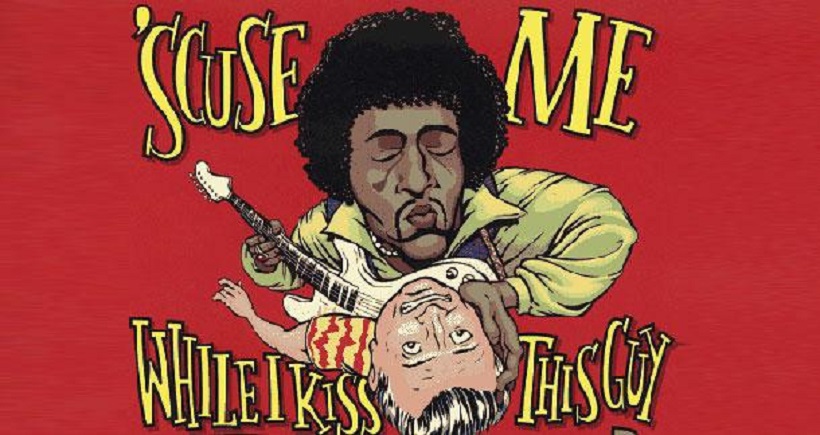A chance remark, and Robert Drewe was off on a hunt for mondegreens – not, as you might think, a new Byron Bay super-vegetable, but a misheard song lyric, and he found plenty…
Always on the lookout for these pieces, I asked my partner, “Any column ideas?” She gave me a puzzled look. “Any coalminers’ ears?” It took a moment to get that sorted out. She’d just produced an excellent example of a mondegreen.
A mondegreen is a phrase misheard or misinterpreted in a way that gives it a new meaning, like in Chinese whispers. My favourite mondegreen is the line from Madonna’s song, Like a Virgin: “ touched for the very first time” that many hear as “touched for the 41st time”, which, to be honest, sounds much more appropriate.
Another great mondegreen is the line in each verse of Creedence Clearwater Revival’s Bad Moon Rising, “There’s a bad moon on the rise,” often heard, entertainingly, as “There’s a bathroom on the right.”
Christmas songs (and not just shepherds washing their socks by night) are noted for their mondegreens: from “Good King Wences last looked out..” as we children used to sing (actually, “Good King Wenceslas looked out…”) to “Olive the Other Reindeer” (“all of the other reindeer,” a line from Rudolph the Red-Nosed Reindeer.) We always thought Olive was cruel. (“Olive the other reindeer/ Used to laugh and call him names…”)
The mondegreen term was coined by the American writer Sylvia Wright in an essay in 1954 entitled The Death of Lady Mondegreen, inspired by a misheard line from an old Scottish ballad: “…They hae slain the Earl o’Moray/And laid him on the green.”
‘Mondegreen lyrics can get messy. According to some Robert Palmer sang in Addicted to Love: ‘Might as well face it, you’re a dick with a glove.’
There are many mondegreen examples in the Bible, such as, from Psalm 23, one featuring that secretive figure in the scriptures, Mrs Murphy: “Surely good Mrs Murphy shall follow me all the days of my life.” (“Surely goodness and mercy…”). And poetry has the crazy, wild battle cry from The Charge of the Light Brigade: “Haffely, Gaffely, Gaffely, Gonward.” (“Half a league, half a league, half a league onward.”
But it’s popular song lyrics that feature mondegreens most often. In one of the first, Elvis grumbled in Hound Dog: “You ain’t never pornographic and you ain’t no friend of mine.” Meanwhile, the Rolling Stones promised in Beast of Burden: “I’ll never leave your pizza burnin’.” And Bob Dylan sang, “The ants are my friends/ They’re blowin’ in the wind.”
The Bee Gees were mondegreen specialists. In Staying Alive, their lyrics were heard as “Steak and a knife/Steak and a knife” but also as “Sayin’ a lie/ Sayin’ a lie.” They confided in More than a Woman that, “Your man’s a woman/your man’s a woman to me”,’ this view backed up by “Bald-headed woman/ bald-headed woman to me.” Meanwhile, the Stones sang, “Hey, Hugh, get off of McCloud” and, in Purple Haze, Jimi Hendrix said, “‘Scuse me while I kiss this guy” (“kiss the sky”).
Mondegreen lyrics can get messy. According to some Robert Palmer sang in Addicted to Love: “Might as well face it, you’re a dick with a glove.” In Losing My Religion, R.E.M. suggested, “Let’s pee in the corner. Let’s pee in the spotlight.” (“That’s me in the corner…”). The Scandinavian group Aqua’s accents turned their hit Barbie Girl into “C’mon body, let’s go potty.” (“C’mon, Barbie, let’s go party.”) AC/DC, in You Shook Me All Night Long, actually sing “She had the sightless eyes” and not “She had me circumcised” though Bon Scott’s jeans made that pretty clear.
When I was a child my father had a complex double mondegreen concerning a housekeeper, Glad (short for Gladys), we had after our mother died. Glad was a martyr-type in thick glasses who was given to heavy sighing during the simplest task. He referred to her (secretly) as “Gladly the cross-eyed bear,” a mondegreen from a hymn: “Kept by Thy tender care, gladly the cross I’d bear.” His mondegreen, grammatists would say, was actually something called an eggcorn, because there’s an intended connection in meaning.
My father was also an exponent of the reverse mondegreen, as in the 1940s song: “Mairzy doats and dozy doats and liddle lamzy divey. A kiddley divey too, wooden shoe.” (Mares eat oats and does eat oats and little lambs eat ivy. A kid’ll eat ivy too; wouldn’t you?”)
But it’s the pledge made by American schoolchildren that’s the best example. The real words are: “I pledge allegiance to the flag of the United States of America, and to the republic for which it stands, one nation, under God, indivisible, with liberty and justice for all.”
But most kids say, “I pledge a lesson to the frog of the United States of America, and to the wee puppet for witches’ hands. One Asian, in the vestibule, with little tea and just rice for all.”







